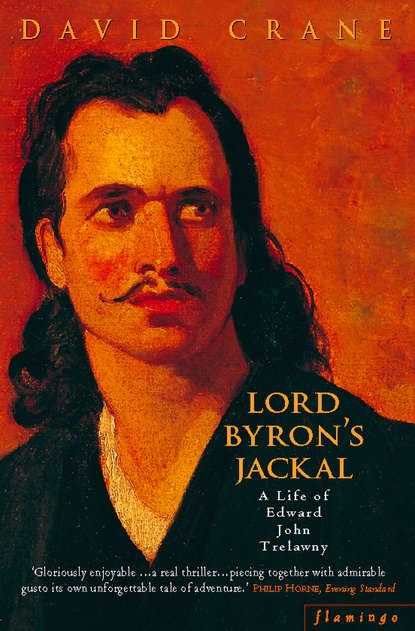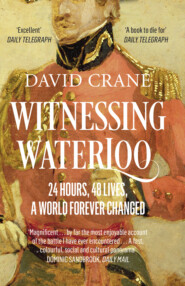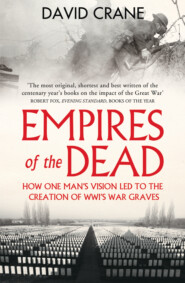По всем вопросам обращайтесь на: info@litportal.ru
(©) 2003-2024.
✖
Lord Byron’s Jackal: A Life of Trelawny
Настройки чтения
Размер шрифта
Высота строк
Поля
The failure of Reshid to follow up his victory by taking Missolonghi limited the short-term significance of this campaign, but the strategic consequences of Peta reverberated dangerously on through the rest of the war. From the first tactless intrusion of Philhellene volunteers there had been an innate prejudice among Greeks against western methods of warfare, and with the contrasting evidence of Peta and Dervenakia at their disposal that breezy sense of superiority which is never far below the surface of the Greek national character hardened into an arrogance that would have fatal consequences.
For the time being, however, the rebellion was safe. With the defeat of Dramali’s army in the east and the withdrawal of Reshid in the west, Turkish initiative and energy were exhausted. Their troops still held on to Patras at the western end of the Gulf and to Modon and Coron – the old ‘Eyes of Venice’ – in the south-west. Up in the north, Greek resistance, isolated and exposed, had all but collapsed. In Attica, though, the former pupil of Ali Pasha, Odysseus Androutses, held Athens. In western Greece the heroism of Missolonghi had saved the town for even greater fame. At sea Ottoman and Greek fleets seemed as bent on avoiding each other as anything else. And in the Peloponnese – or the Morea as it was more usually known – the original heartland of the revolution, the Greeks did what Greeks have always done best when freed of external threat, and turned on one other.
Even through the dangers and triumphs of 1821–2, the divisions among the Greek leaders were never far below the surface, and by the middle of 1823 the country was sliding inexorably towards civil war. To the enthusiastic Philhellenes of Europe and America, it might seem that Greece had found itself the heirs to Demosthenes and Epaminondas, and yet even after a National Constitution and Government were established at Epidaurus on 13 January, with an executive and legislature and all the trappings of modern statehood, real power remained in the hands of local factions bent on turning the rebellion to their own narrow profit.
The politics of revolutionary Greece were so riddled by family and regional loyalties and feuds that no coherent picture is possible, but there were four main factions that dominated this struggle for power: the military capitani who won the first battles of the conflict; the great island families, grown powerful on the rich pickings of the Napoleonic War, who controlled the Greek fleets; the landlords or ‘primates’ of the Morea who had exercised such influence under the Turks; and the educated Phanariots and Greeks of the diaspora who had flooded in at the beginning of the revolution.
The social and economic realities which lay behind these divisions were real enough to hold serious consequences for the future of Greece, but to most foreigners and natives allegiances were more a matter of personalities than politics. In Athens, Odysseus Androutses governed eastern Greece with an Ali Pasha-like selfishness which made him a law to himself, but in western Greece and the Morea all those antagonisms that the successes of 1822 had exposed, the divisions between civilian and military, between constitutionalist and brigand, between Phanariot and native Greek, embodied themselves most vividly in the destructive rivalry of the two men who had presided over disaster and triumph at Peta and Dervenakia, Alexander Mavrocordato and Theodore Colocotrones.
It would be difficult to imagine two leaders more opposed in their backgrounds, aspirations or personalities. A descendant of the great Phanariot families that had governed in the Danubian provinces through the eighteenth century, ‘Prince’ Alexander Mavrocordato as he was styled, was living in impoverished exile in Italy – and teaching Mary Shelley Greek – when the rebellion broke out in the spring of 1821.
Among the first volunteers to sail from Marseilles to join the cause, Mavrocordato was perhaps its only leader who not only spoke but understood the languages and the ‘language’ of European diplomacy and Philhellenism. Among the native commanders of the rebellion Colocotrones or Petro Bey might invoke the shade of Epominandas or the principles of the nation state when it suited their purposes, but their Hellenism and liberalism were the thinnest of veneers on a narrow feudalism which had nothing in common with the modern and centralized Greece of which Mavrocordato dreamed at Epidaurus.
It is perhaps perverse to dismiss the career of the first President of Modern Greece as a failure, but because of this fundamental difference of vision Mavrocordato was never as successful a leader as his talents and meteoric rise had seemed to promise. At the first congress of 1821 he had been elected to the Presidency of the Assembly and then the country, and yet even in this moment of triumph, the determination of the old primates and captains to hold on to power guaranteed that while the Constitution might be written in his image Greece would still be run in theirs.
With the military failure of Mavrocordato at Peta any last hope of a stable and powerful central government was dealt a fatal blow, but the fact is that with his western frock coat, spectacles and principles he was always going to be at a disadvantage in a country locked in a ruthless and savage war. To the Greeks who had fought at Tripolis and Dervenakia there was inevitably something alien in his western skills, and it is a sobering feet about the way Greece still sees its revolution that while there is only one statue in the whole country to the most civilized of its leaders, it is difficult to find anywhere – from Tripolis to the old Parliament building in Athens – where the hawk-like features of Theodore Colocotrones do not glower down from under a ‘classical’ helmet on a nation only too happy to sacrifice political integrity to glamour.
Avaricious and violent, corrupt, bold, cynical and charismatic, the fifty-year-old Colocotrones was everything as a military leader that the cosmopolitan and haplessly civilian Mavrocordato could never be. ‘It would be impossible for a painter or novelist to trace a more romantic delineation of a robber chieftain,’ the Philhellene soldier and great historian of the war, Thomas Gordon, wrote of Colocotrones,
tall and athletic, with a profusion of black hair and expressive features, alternately lighted up with boisterous gaiety, or darkened by bursts of passion: among his soldiers, he seemed born to command, having just the manners and bearing calculated to gain their confidence.
(#litres_trial_promo)
Along with this air of authority, with the physical strength and presence so essential to any klepht leader, went a history to match. Born under a tree in the hills of Messenia on the Easter Monday of 1771, Colocotrones came from a long line of Turk-haters who had slid between policing the mountains as armatoles and living off them as bandits in the central Morea.
It was always his proud boast that in four hundred years of occupation his family had never once succumbed to Ottoman rule, and at the age of only fifteen Colocotrones himself fell naturally into the brigand life which had already killed his father and thirty-three of his nearest kin.
After twenty years of indiscriminate banditry against Greek and Turk alike, he was forced into exile in the Ionian Isles, but when the revolution broke out in 1821 he was ready again to resume his old life with a new and expanded brief. Present at the fell of Kalamata in the first days of the uprising, his influence and guerrilla talents soon gained him command of the troops besieging Tripolis, and victory there and at Dervenakia the following year gave him the plunder and prestige to make him the most powerful man in the Morea.
It was a position he exploited entirely for his own ends. He was not interested in the fate or even the idea of a Greece beyond the Peloponnese. To Colocotrones the war was about wealth and power, not about nationhood or any of the other battle cries of Philhellenism. In April 1823 he used the threat of his soldiers to have himself and Petro Bey elected to the Presidency and Vice Presidency, but it was a gesture of contempt for the position Mavrocordato had once held and not an endorsement of the political process. His authority, like his vision, was that of a chieftain, and by the middle of the year the rump of the government that he had usurped had fled from his vengeance to the safety and irrelevance of the islands.
It was this political situation, with the two-year-old nation only weeks from civil war, with feudal warlords in control of their private fiefdoms in the Morea and eastern Greece, with western Greece in chaos, the government in exile and Mavrocordato fled for his life to the island of Hydra, which greeted Byron when he landed at Argostoli.
From on board the Hercules he had pointed out the distant coastline of the Morea with all the excitement of a man reliving his youth, but it was not long before the reality that lay behind the shimmering image was brought rudely home. ‘The instinct that enables the vulture to detect carrion from far off,’ Trelawny wrote of their arrival, ‘is surpassed by the marvellous acuteness of the Greeks in scenting money.
The morning after our arrival a flock of Zuliote refugees alighted on our decks, attracted by Byron’s dollars. Lega, the steward, a thorough miser, coiled himself on the money-chest like a viper. Our sturdy skipper was for driving them overboard with hand-spikes. Byron came on deck in exuberant spirits, pleased with their savage aspect and wild attire, and, as was his wont, promised a great deal more than he should have done.
(#litres_trial_promo)
In the months ahead Byron would have to pay for the caprice that made him take on these Suliots as a bodyguard, but it was the wider chaos of Greece that was soon engrossing his attention. From the moment that he went ashore at Argostoli on 3 September 1823, the struggle among the Greek factions for his money and support began. ‘No stranger,’ the young Philhellene George Finlay,
who was on Cephalonia at this time, recalled, ‘estimated the character of the Greeks more correctly than Lord Byron …’
It may, however, be observed that to nobody did the Greeks ever unmask their selfishness and self-deceit so candidly. Almost every distinguished statesman and general sent him letters soliciting his favour, his influence, or his money. Colocotrones invited him to a national assembly at Salamis. Mavrocordato informed him that he would be of no use anywhere but at Hydra, for Mavrocordato was then in that island. Constantine Metaxa who was governor of Mesolonghi, wrote, saying that Greece would be ruined unless Lord Byron visited that fortress. Petrobey used plainer words. He informed Lord Byron that the true way to save Greece was to lend him, the bey, a thousand pounds. With that sum not three hundred but three thousand Spartans would be put in motion to the frontier, and the fall of the Ottoman empire would be certain.
(#litres_trial_promo)
Byron was never one to need much encouragement towards parsimony, but it was not now just his own money that was at stake. After an initial coolness in Britain to the fate of Greece, there were moves afoot in London to raise a Stock Exchange loan on her behalf, and as the sole agent of the London Greek Committee on the spot Byron had to take this into account. It made him move with a caution that other Philhellenes would have done well to emulate. He was not going to budge a foot farther until he could see his way, he told Trelawny, and to the Greeks he was equally firm. ‘And allow me to add once for all,’ he addressed their government in a letter,
I desire the well-being of Greece, and nothing else; I will do all I can to secure it; but I cannot consent, I never will consent that the English public, or English individuals, should be deceived as to the real state of affairs. The rest, gentlemen, depends on you: you have fought gloriously; act honourably towards your fellow-citizens, and towards the world; then it will no more be said, as it has been said for two thousand years, with the Roman historian, that Philopoeman was the last Grecian.
(#litres_trial_promo)
The vigour and propriety of every action of Byron’s in these dealings with the Greek parties makes an extraordinary contrast with the indolent rhythms of his Italian life. There were certainly times on Cephalonia when the seeming hopelessness of his task made him wish that he had never come, and yet in spite of all the disappointments the truth is that he had not felt so alive and decisive in years, writing letters and meeting visiting Greeks, arranging or parrying loans, assessing military reports and projects for steam vessels, or playing the strategist with the English Representative and future conqueror of Sind, Colonel Napier.
He was also working to a strict regime preserved in the account of Pietro Gamba, Teresa Guiccioli’s brother. He would leave his bedroom at nine, and for the next two hours would deal with his correspondence, with Gamba to help. He would then breakfast on a cup of tea. At noon he would ride until three, and dine on cheese and vegetables. There would then be pistol shooting practice, and after that he would retire to his room until seven, only then emerging to talk until midnight.
There was, too, another aspect of Byron’s existence on Cephalonia which is more difficult to quantify but no less important to his emotional well-being. During the long years of exile in Italy there had never been any shortage of English acquaintances in his life, but the common denominator of the Pisa Circle, the tie as it were that bound them all together, was a sense of alienation which made their ‘Englishness’ a burden rather than a source of any emotional comfort.
On Cephalonia it was different. Over the first three years of the Greek rebellion there had been a gradual thawing of British attitudes towards the insurgents, but Turkey was still technically an ally and Britain was as cautious in her sympathies for a people in revolt from their rightful sovereign as anywhere in conservative Europe. In the Ionian Isles, governed by that irascible foe of Greece, Sir Thomas Maitland, this caution shaded into downright hostility but Cephalonia was an exception. There, the underlying popular sympathy for the Greeks that ran as a powerful countercurrent to government policy, found eloquent support in the official Representative. Byron had chosen the island in the first place because of Napier’s strong Greek sympathies, and in his company or that of the garrison officers who surprised and touched Byron with the warmth of their welcome, he probably felt more entirely at home – more English even – than he had done in the seven years of his exile.
There was, however, little place for Trelawny in all this. Before he left Italy he had managed to half-convince himself that he was only using Byron to get to Greece, but as the ‘Childe’ moved from on board the Hercules into a cottage near Argostoli and settled into his fixed routine, the fears he had confided to Mary Shelley weeks earlier seemed only too justified. ‘The Poet’s attention’, he had written to her with an authentic mix of resentment and pride, ‘and professed kindness is boundless; he leaves everything to my discretion’;
if I had confidence in him this would be well, but I now only see the black side of it; it will eventually rob me of my free agency, by so weaving me in with his fortunes that I may have difficulty in separating myself from them.
(#litres_trial_promo)
Even now this would probably not have much mattered, had he been able to feel any sense of importance in the connection. In Italy his feelings for Claire Clairmont had inevitably drawn him into her camp against Byron, and yet so long as he had been in charge of the Bolivar or giving orders on the Hercules he could at least preserve an illusion of independence that was his own best protection against his meanest instincts.
With their arrival on Cephalonia, however, and the sense of his own waning importance, even that illusory prop to his self-esteem was gone. He could go on competing in those kind of ways that were his sole resort, could shoot, box or swim better than Byron. But Byron now belonged to another and larger world than anything he could imagine, to a world of politics and finance which left him with a galling proof of his own insignificance and that sense of emotional abandonment which shadowed all his deepest relationships.
‘Dear Hunt,’ he wrote on 2 September, continuing a letter he had begun three weeks earlier: ‘You will see a long blank, in which nothing having been done, I had nothing to communicate.’
(#litres_trial_promo) It was a blank Trelawny was ill-equipped to fill. His motives for coming to Greece, his aspirations, had none of Byron’s complexity about them, none of his selflessness, and no room now for any of his circumspection. Whatever cloak of Byronic despair he might throw over them in his letters to Claire or Mary, he was there in search of raw excitement and little else.
‘When was there so glorious a banner as that unfurled in Greece?’ he had asked Claire in his last letter to her from Italy. ‘Who would not fight under it?’
(#litres_trial_promo) As the days stretched into weeks on Cephalonia, however, the prospect of fighting was looking increasingly distant. Rumours filtered across the channel that separated them from the Morea of ‘battles never fought, prisoners never taken’.
(#litres_trial_promo) There was talk of the islands and the Peloponnese at loggerheads; of the factions on the brink of civil war.
Despite the presence of refugees, though, they were no nearer that conflict than when they first arrived. By the beginning of September, Trelawny had determined to assert his independence and leave, to proceed to the Greek centre of government, he told Hunt, and ‘apply to be actively employed’.
(#litres_trial_promo) In a letter to Mary Shelley written four days later on the 6th, he was at once more venomous about his decision and more silkily double-tongued. ‘The Noble Poet has been seized with his usual indecision, when just on the brink’, he told her, ‘and when I would have him, without talking, leap.’
After being here a month in idleness, we seemed both to have taken our separate determination, his to return to Italy and mine to go forward with a tribe of Zuliotes to join a brother of Marco Bozzaris, at Missolonghi … He [Byron] has written nothing more, but will I doubt not. Our intimacy has never been ruffled, but smoother than ever, and I am most anxious in upholding his great name to the world.
(#litres_trial_promo)
That last sentence is revealing. Whatever the private grievances that might emerge in his letters, Trelawny knew where his public credit lay. His plans, so extravagant in their telling here, were more circumscribed, more dependent on Byron than he would ever have confessed to the Pisan women. On 2 September, he was loading his belongings onto a small vessel, waiting for an opportunity to run the Turkish blockade under the cover of dark, and land on the western coast of the Peloponnese. His instructions were to go with Hamilton Browne to the Greek leaders, and acting as Byron’s secretaries, deliver letters and report back on the political situation.
On the night of the 6th, they were at last ready to leave. Their farewell was warm. ‘As I took leave of him,’ Trelawny recalled in his Records, ‘his last words were, “Let me hear from you often, – come back soon. If things are farcical, they will do for ‘Don Juan’; if heroical, you have another canto of ‘Childe Harold’.”’
(#litres_trial_promo)
It was the last time Trelawny saw Byron. Farewells over, he and Hamilton Browne embarked on a caique for the short journey across to the Peloponnese, beaching the next morning without incident on the scruffy coastline beneath the half-ruined tower of the Pirgos customs house.
In classical times, this north-west corner of the Peloponnese had been celebrated for its prosperity, but the long depredations of Turkish rule had begun a task that two years of war had now completed. There was only a solitary guard on the customs post to mark their arrival, a ‘creature’ of Colocotrones living under semi-siege in a sort of hen coop at the top of the tower, reachable only by a ladder which he pulled up at night. It was a necessary precaution. The sole authority he recognized, he told Trelawny, was Colocotrones’s, but even his writ had a limited jurisdiction. A few days earlier a party of Turks from Patras had raided the village of Gastoumi a few miles to the north, killing a number of inhabitants and carrying off women and other booty.











